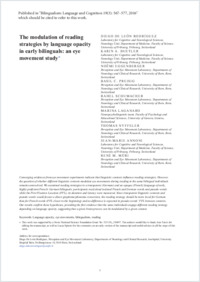The modulation of reading strategies by language opacity in early bilinguals: an eye movement study
- De León Rodríguez, Diego Laboratory for Cognitive and Neurological Sciences, Neurology Unit, Department of Medicine, Faculty of Science, University of Fribourg, Switzerland
- Buetler, Karin A. Laboratory for Cognitive and Neurological Sciences, Neurology Unit, Department of Medicine, Faculty of Science, University of Fribourg, Switzerland
- Eggenberger, Noëmi Perception and Eye Movement Laboratory, Departments of Neurology and Clinical Research, University of Bern, Switzerland
- Preisig, Basil C. Perception and Eye Movement Laboratory, Departments of Neurology and Clinical Research, University of Bern, Switzerland
- Schumacher, Rahel Perception and Eye Movement Laboratory, Departments of Neurology and Clinical Research, University of Bern, Switzerland
- Laganaro, Marina Neuropsycholinguistic team, Faculty of Psychology and Educational Sciences, University of Geneva, Switzerland
- Nyffeler, Thomas Perception and Eye Movement Laboratory, Departments of Neurology and Clinical Research, University of Bern, Switzerland
- Annoni, Jean-Marie Laboratory for Cognitive and Neurological Sciences, Neurology Unit, Department of Medicine, Faculty of Science, University of Fribourg, Switzerland
- Müri, René M. Perception and Eye Movement Laboratory, Departments of Neurology and Clinical Research, University of Bern, Switzerland
-
15.06.2015
Published in:
- Bilingualism: Language and Cognition. - 2016, vol. 19, no. 3, p. 567–577
English
Converging evidences from eye movement experiments indicate that linguistic contexts influence reading strategies. However, the question of whether different linguistic contexts modulate eye movements during reading in the same bilingual individuals remains unresolved. We examined reading strategies in a transparent (German) and an opaque (French) language of early, highly proficient French–German bilinguals: participants read aloud isolated French and German words and pseudo- words while the First Fixation Location (FFL), its duration and latency were measured. Since transparent linguistic contexts and pseudo-words would favour a direct grapheme/phoneme conversion, the reading strategy should be more local for German than for French words (FFL closer to the beginning) and no difference is expected in pseudo-words’ FFL between contexts. Our results confirm these hypotheses, providing the first evidence that the same individuals engage different reading strategy depending on language opacity, suggesting that a given brain process can be modulated by a given context.
- Faculty
- Faculté des sciences et de médecine
- Department
- Médecine 3ème année
- Language
-
- English
- Classification
- Biological sciences
- License
-
License undefined
- Identifiers
-
- RERO DOC 261139
- DOI 10.1017/S1366728915000310
- Persistent URL
- https://folia.unifr.ch/unifr/documents/305201
Statistics
Document views: 129
File downloads:
- pdf: 154
